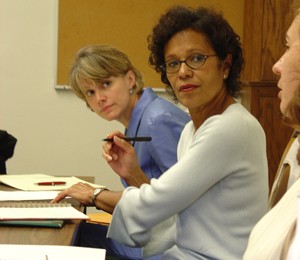
The annual Summer Writers Institute at Washington University in St. Louis returns for its 17th year, this time with a new, compressed format geared toward working professionals and offering workshops in four genres.
The new format takes place over nine days, beginning Friday, July 13, through Saturday, July 21, with evening workshops in fiction; creative nonfiction; flash fiction and prose poetry; and screenplay writing.
Weekends will be devoted to daylong seminars, where local authors and experts will lecture on various craft subjects.
“Not everyone can take two weeks off work to participate,” says Rebecca Copeland, PhD, associate dean of University College in Arts & Sciences, director of Summer School and professor of Japanese language and literature in Arts & Sciences. “We are hoping to make the institute more accessible to the working person with this new format, while at the same time keeping in mind retirees and those who don’t work 9-to-5 jobs.”
The institute will begin the evening of Friday, July 13, with an introduction and orientation, followed by two days of seminars and craft talks. Monday through Friday, July 16-20, the workshops will take place from 5:30 p.m.-8:30 p.m. The institute will close Saturday, July 21, with a final day of workshops and seminars.
Another way the institute hopes to appeal to a cross section of participants is to take advantage of WUSTL’s rich literary heritage.
“Washington University has enjoyed an impressive array of literary talent over the years,” Copeland says. “There must be something about this campus that encourages great writing.
“We’re hoping to tap into that culture and provide spaces on campus where participants, after maybe working a half-day, can come here in the afternoon to work, reflect, retreat and get ready for the workshops in the evening,” she says.
“The compressed format will make it more dynamic,” says Anton DiSclafani, lecturer in English in Arts & Sciences and coordinator of the Summer Writers Institute. “It will be an intensely focused nine days, but we’re keeping the same components that have made it so popular in the past — intensive writing exercises, workshops and craft talks.”
Professional, published writers, all experts in their fields, will teach each workshop. The institute also will feature one-on-one critiques, faculty readings and an “open mic” opportunity for participants’ work to be read aloud. Sections will be kept small to facilitate discussion.
“The institute was a great way for me to jump-start my writing,” says Elizabeth Tucker, publisher of St. Louis’ Alive Magazine and a participant in creative nonfiction in 2010 and ’11. “It helped me set aside time in my life to work on my craft, and the feedback I received helped me further distinguish my voice as a writer.”
Tucker, who plans on attending again this summer, is working toward and nearly completing a Creative Writing Certificate through University College.
“Even though I learned a lot the past two summers, it was always tough to take that much time away from work,” Tucker says. “This new format will help me to navigate the work/writing balance a little bit better.”
The four genres:
- Screenplay writing, taught by Richard Chapman, senior lecture in Film & Media Studies in Arts & Sciences. This workshop will explore various elements, structures and styles used in crafting a motion picture screenplay. Participants will begin writing the first 10 pages of a screenplay under the tutelage of Chapman, a veteran screenwriter and movie producer who has written more than 200 hours of network TV series, including such credits as Simon & Simon, Disney’s Absent-Minded Professor and the Golden Globe and Emmy nominated HBO Original Movie, Live From Baghdad.
- Fiction, taught by Anne Sanow, author of the story collection Triple Time, winner of the 2009 Drue Heinz Literature Prize and the 2010 L. L. Winship/PEN New England Award for fiction. The book also was selected as a “Must-Read Book” from the 10th Annual Massachusetts Book Awards. The workshop will hone the writing process and teach ways to make a story detailed and vivid while also keeping it moving forward. Close attention will be paid to the rhythm and texture of language.
- Flash fiction and prose poetry, taught by David Schuman, lecturer in the Department of English. The newest genre, flash fiction is a compressed form of fiction that accomplishes in its brevity what longer fiction cannot. It’s geared toward the writer wishing to be stretched and explore different avenues in his or her work. Schuman won a Pushcart Prize in 2007 and his story, “Stay,” was listed as one of a hundred distinguished stories in Best American Short Stories.
- Creative nonfiction, taught by Kathleen Finneran, writer-in-residence in the Department of English and author of the memoir The Tender Land: A Family Love Story. The workshop will focus on the challenges of creating literature by using a personal life as the subject matter. Writing exercises will be designed to trigger creativity and shape the memoir. Finneran is the recipient of the Missouri Arts Council Writers’ Biennial Prize, a Whiting Writers’ Award and a Guggenheim Fellowship.
All courses will be offered through University College and on a for-credit basis. Tuition is $1,815. Writing samples are required for workshops in fiction and creative nonfiction. Registration opens Wednesday, March 28.
For more information, and to register, visit pages.wustl.edu/swi. The institute also has a Facebook page at facebook.com/WUSTLsummerwriters.